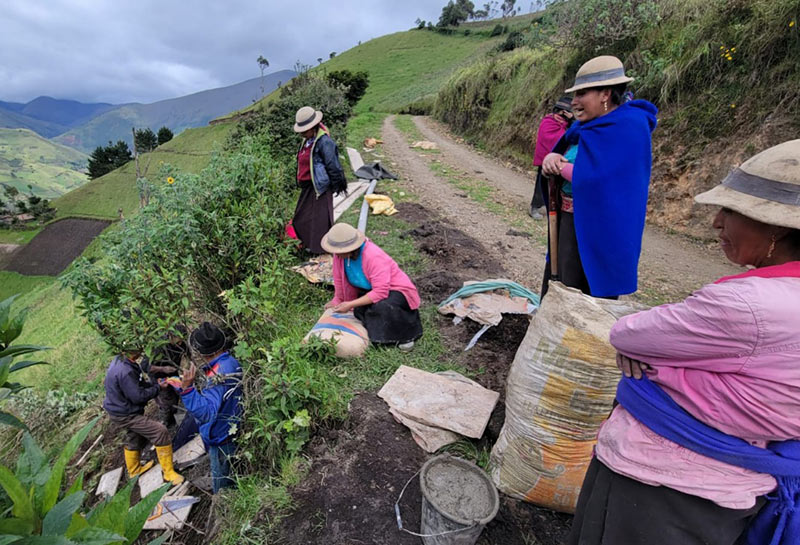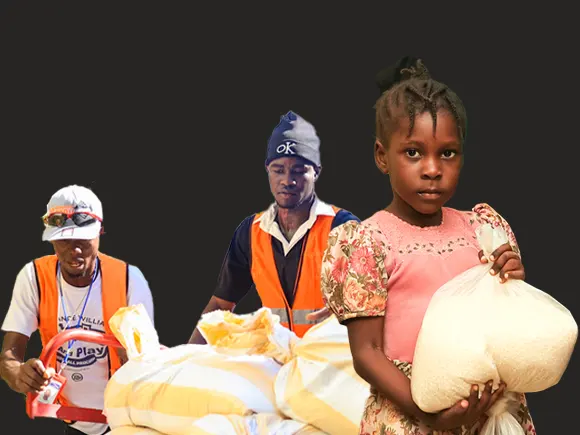During National Hispanic Heritage Month, we celebrate the rich history, culture, and contributions of Hispanic and Latino communities in the United States.
This annual observance from September 15 through October 15, serves as an opportunity to recognize the significant strides made by individuals and organizations, both locally and globally, to uplift and empower communities in the countries where Food For The Poor serves.
One remarkable way to celebrate this year is by highlighting initiatives that focus on improving living conditions and well-being in the Hispanic countries where Food For The Poor provides help.
An outstanding project that perfectly demonstrates the spirit of National Hispanic Heritage Month is an initiative in Ecuador designed to address the issue of bringing access to water closer to communities in need.
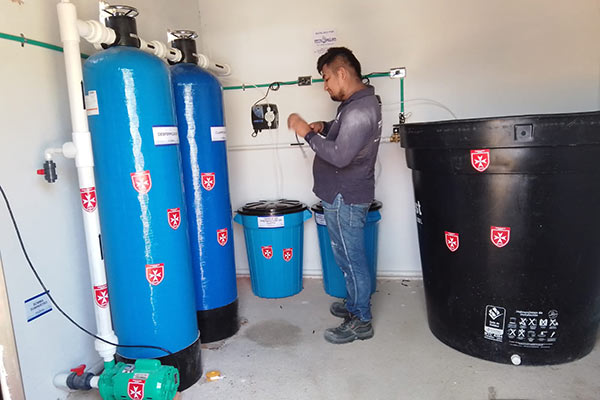
This project’s participants are partnering with the community of Visote/Nueva Esperanza in Ecuador, Food For The Poor, Legado Ecuador, and the local government.
Working together, these groups will optimize and improve the existing water system in the community of Visote/Nueva Esperanza.
By rehabilitating the community’s current water system, this project ensures that residents have consistent access to treated water.
The water project focuses on rehabilitating and enhancing various existing components of the water system that have deteriorated over time.

These water system components, which play a critical role in ensuring quality water access, include:
- Water catchments
- Air and drainage valves
- Reserve tanks
- The water distribution network
How Does the Enhanced Water System Work?
Four strategies to bring water closer to a community in need:
- Rehabilitation of Water Infrastructure: Replace outdated and malfunctioning components of the existing water system. The goal is to deliver treated water to the community.
- Community Engagement: Collaboration with the community is crucial to the success of this project. Manual excavation work for the PVC pipe installation is done by community members, creating a feeling of ownership and a sense of responsibility.
- Water Treatment and Storage: By upgrading the reserve tank and implementing a chlorination unit, this project ensures the potability of the water. This step helps to maintain the quality of the water supply.
- Home Connections: This project will give 58 families home connections for direct access to treated water.
Empowering Communities and Families
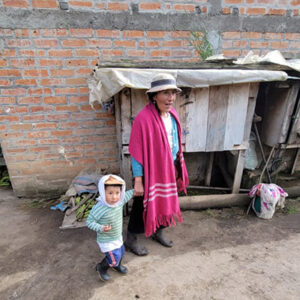
The Visote/Nueva Esperanza community in Ecuador was facing chronic child malnutrition and limited consistent access to treated water.
Through improved water infrastructure – water access directly in resident’s homes – families will have the means to lead healthier lives, reducing the incidence of child malnutrition and other waterborne health issues.
Celebrating Progress
During National Hispanic Heritage Month, it’s so important to recognize the incredible efforts being made to improve lives in Hispanic countries.
Projects like the water rehabilitation in Visote/Nueva Esperanza illustrate the power of the collaboration and community engagement. By sharing these transformative projects, we not only celebrate Hispanic heritage, but also inspire one another to contribute positively to communities in need.
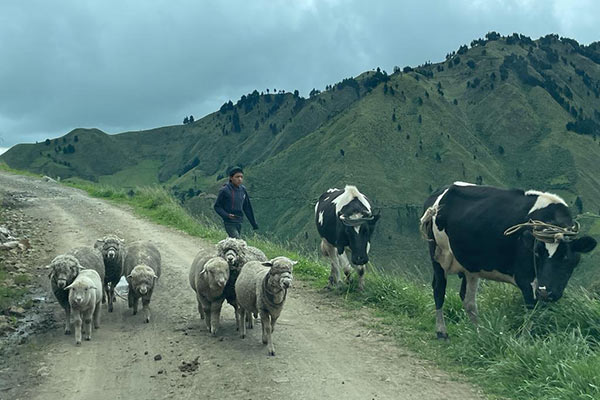
Progress, power, and empowerment are worth celebrating, and by working together, we can make a global difference for Hispanic communities in need.
Building Sustainable Futures
Another opportunity to celebrate the spirit of empowering and supporting global Hispanic and Latino communities is by highlighting an innovative climate-change and eco-friendly initiative. This sustainable development effort is located in Tunja, Colombia, and is a collaborative project to build eco-friendly housing in Tunja.
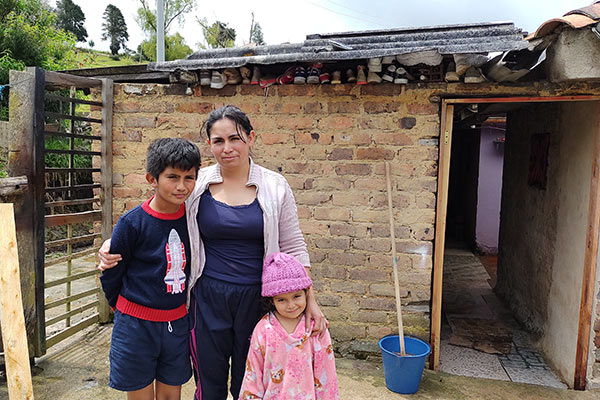
A Transformative Project
This inspiring endeavor to build eco-friendly housing is in partnership with Corporación Organización El Minuto de Dios and Food For The Poor and is a testament to the commitment of our longstanding partners and donors who support sustainable development.
By primarily focusing on providing quality housing for communities in need, this eco-friendly housing project brings hope and change to the residents.

Empowerment Through Sweat Equity: A Foundation for Ownership
“Sweat equity” involves each family in the building of their future home by actively participating in laying down its concrete foundation. This goes beyond construction; each person’s physical contribution instills a sense of pride, ownership, and responsibility within families. By personally investing their efforts, families are invested in shaping their futures.
An Innovative Approach Creates Lasting Impact
The eco-friendly housing being built in Tunja, Colombia, not only provides a place for residents to raise their families but also promotes sustainable living using fiber-cement technology.
Innovative fiber-cement technology offers multiple benefits, including:
- Durability and Low Maintenance: Unlike traditional wood homes that deteriorate over time, fiber-cement homes have a longer lifespan and require minimal maintenance.
- Environmental Responsibility: Fiber-cement homes have a reduced carbon footprint, consume less water and wood, and generate fewer waste materials.
- Energy Efficiency: These homes are designed for energy efficiency, consuming less electricity and water, contributing to a sustainable lifestyle.
- Versatility and Strength: Fiber-cement’s versatility allows for efficient design and construction, while providing resistance to earthquakes, pests, fire, and weathering.
In the Hispanic communities where Food For The Poor serves, donors provide new beginnings for families.
It’s through projects like the ones discussed in this blog that donors reach deep into Hispanic communities and help families break free from a challenging cycle of limited opportunities.
National Hispanic Heritage Month is a joyful reminder that progress, innovation, and sustainable development are worth celebrating.
The water project in the community of Visote/Nueva Esperanza in Ecuador and the eco-friendly housing project in Tunja, Colombia, show how collaboration and a commitment to uplifting communities in need can provide families more stable and sustainable futures.
As we celebrate the rich heritage of Hispanic and Latino communities, we also want to celebrate the positive impact you can make in even more communities as a Food For The Poor donor.
Visit Food For The Poor online at www.FoodForthePoor.org to discover how you can give a gift in support of hardworking Hispanic and Latino families and communities.

